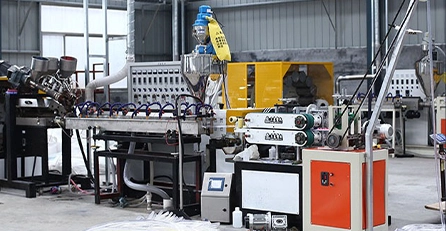Innovative Solutions for Vacuum Pipes in Modern Engineering Applications and Design
Understanding Vacuum Pipes Applications, Benefits, and Innovations
Vacuum pipes, also known as vacuum tubes or vacuum pipelines, are integral components in various industries, particularly in the field of engineering and physics. They are designed to transport materials and fluids through negative pressure environments, effectively minimizing any external influence that may compromise the material being conveyed. This article delves into the functionality, benefits, applications, and innovative advancements regarding vacuum pipes.
The Fundamentals of Vacuum Pipes
At its core, a vacuum pipe operates under the principle of sucking rather than pushing. This means that unlike traditional pipelines that rely on pumps to drive fluids through them, vacuum pipes utilize atmospheric pressure to draw materials into the piping system. The absence of air in a vacuum environment prevents contamination and reduces resistance, facilitating a smooth, efficient flow of materials.
Vacuum pipes are constructed from various materials, including stainless steel, glass, and certain plastics, each chosen based on the specific requirements of the application. Their design can vary significantly—from thin-walled tubes used in laboratory settings to robust structures intended for industrial processes—demonstrating their versatility across various fields.
Applications of Vacuum Pipes
The applications of vacuum pipes are broad and varied. Here are some of the primary areas in which they are used
1. Industrial Manufacturing Vacuum pipes are extensively used in the manufacturing sector for transporting materials such as powders, granules, and pellets. By utilizing a vacuum system, manufacturers can minimize dust and spillage, enhancing workplace safety and efficiency.
2. Food Processing In the food industry, maintaining hygiene is paramount. Vacuum pipes help in conveying food products while limiting exposure to airborne contaminants. This is particularly important for avoiding spoilage and ensuring that food products are safe for consumption.
3. Pharmaceuticals The pharmaceutical sector benefits immensely from vacuum piping systems. They allow for the efficient transport of raw materials and finished products while adhering to stringent health regulations. Additionally, the use of vacuum pipes in drug formulation processes helps maintain the integrity and efficacy of sensitive compounds.
4. Waste Management In waste collection and processing facilities, vacuum pipes are used to streamline the movement of waste materials. These systems help reduce odor and maintain a cleaner working environment by efficiently conveying waste away from collection points.
5. Research and Development Laboratories Vacuum pipes are essential in laboratories for conducting experiments that require a controlled environment free from air or other external factors. By enabling the safe transport of volatile materials, vacuum pipes play a crucial role in the innovation of new materials and chemicals.
Benefits of Vacuum Pipes
vacuum pipes

There are numerous advantages to utilizing vacuum pipes
- Minimized Contamination By operating in a vacuum environment, these pipes dramatically reduce the risk of external contaminants affecting the transported materials.
- Efficiency and Speed Vacuum systems can transport materials faster than traditional systems, which aids in optimizing production processes.
- Energy Savings Although vacuum systems require energy to maintain the vacuum, they often reduce overall energy consumption by decreasing the need for large pumps and motorized systems.
- Reduced Maintenance The simple design of vacuum pipes reduces wear and tear, minimizing maintenance requirements and downtime in industrial applications.
Innovations in Vacuum Pipe Technology
Advancements in technology continue to shape the future of vacuum pipes. Recent innovations include
- Smart Vacuum Systems The integration of IoT technology into vacuum systems allows for real-time monitoring and control, enabling predictive maintenance and optimizing operational efficiency.
- Sustainable Materials With an increased focus on sustainability, materials used in vacuum pipe manufacturing are becoming more eco-friendly, facilitating recycling and reducing environmental impacts.
- Enhanced Design Innovations in pipe geometry and surface treatments have improved the flow characteristics within vacuum systems, making them even more efficient.
Conclusion
Vacuum pipes are vital components in many industries, providing unparalleled efficiency and safety in transporting materials. Their ability to operate in a controlled environment free from contamination makes them indispensable, particularly in sensitive fields such as food processing and pharmaceuticals. As technology continues to advance, we can expect further innovations that enhance the effectiveness of vacuum pipes, ensuring they remain integral in meeting the demands of modern industry. With their diverse applications and numerous benefits, vacuum pipes are poised to play a crucial role in the evolution of material transport systems across the globe.
-
Top Quality Oxy Acetylene Hoses for Sale Fit for Welding DemandsNewsJul.28,2025
-
The Future of Pneumatic Air Tubes in IndustryNewsJul.28,2025
-
Superior and Reliable LPG Hose Pipe Solutions for Every NeedNewsJul.28,2025
-
Exceptionally Durable and Versatile Premium Braided PVC TubingNewsJul.28,2025
-
Best Adapters for Connecting Garden Hose to PVC Pipe ConnectionsNewsJul.28,2025
-
The Essential Role of LPG Hoses in Safe and Efficient Gas DistributionNewsJul.16,2025














